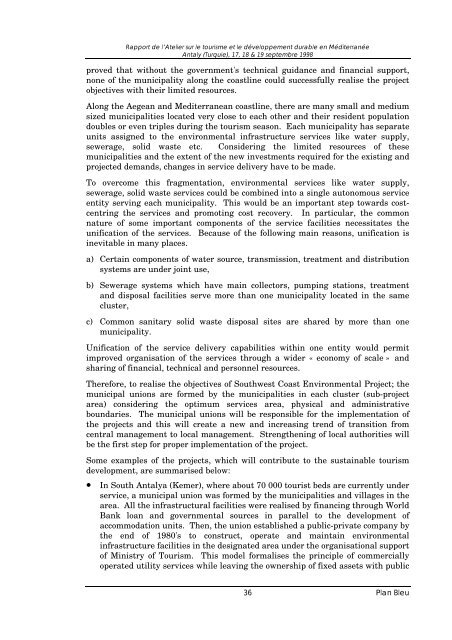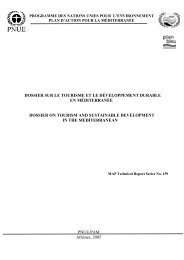MEDITERRANEAN ACTION PLAN
MEDITERRANEAN ACTION PLAN
MEDITERRANEAN ACTION PLAN
Create successful ePaper yourself
Turn your PDF publications into a flip-book with our unique Google optimized e-Paper software.
Rapport de l’Atelier sur le tourisme et le développement durable en Méditerranée<br />
Antaly (Turquie), 17, 18 & 19 septembre 1998<br />
proved that without the government's technical guidance and financial support,<br />
none of the municipality along the coastline could successfully realise the project<br />
objectives with their limited resources.<br />
Along the Aegean and Mediterranean coastline, there are many small and medium<br />
sized municipalities located very close to each other and their resident population<br />
doubles or even triples during the tourism season. Each municipality has separate<br />
units assigned to the environmental infrastructure services like water supply,<br />
sewerage, solid waste etc. Considering the limited resources of these<br />
municipalities and the extent of the new investments required for the existing and<br />
projected demands, changes in service delivery have to be made.<br />
To overcome this fragmentation, environmental services like water supply,<br />
sewerage, solid waste services could be combined into a single autonomous service<br />
entity serving each municipality. This would be an important step towards costcentring<br />
the services and promoting cost recovery. In particular, the common<br />
nature of some important components of the service facilities necessitates the<br />
unification of the services. Because of the following main reasons, unification is<br />
inevitable in many places.<br />
a) Certain components of water source, transmission, treatment and distribution<br />
systems are under joint use,<br />
b) Sewerage systems which have main collectors, pumping stations, treatment<br />
and disposal facilities serve more than one municipality located in the same<br />
cluster,<br />
c) Common sanitary solid waste disposal sites are shared by more than one<br />
municipality.<br />
Unification of the service delivery capabilities within one entity would permit<br />
improved organisation of the services through a wider « economy of scale » and<br />
sharing of financial, technical and personnel resources.<br />
Therefore, to realise the objectives of Southwest Coast Environmental Project; the<br />
municipal unions are formed by the municipalities in each cluster (sub-project<br />
area) considering the optimum services area, physical and administrative<br />
boundaries. The municipal unions will be responsible for the implementation of<br />
the projects and this will create a new and increasing trend of transition from<br />
central management to local management. Strengthening of local authorities will<br />
be the first step for proper implementation of the project.<br />
Some examples of the projects, which will contribute to the sustainable tourism<br />
development, are summarised below:<br />
• In South Antalya (Kemer), where about 70 000 tourist beds are currently under<br />
service, a municipal union was formed by the municipalities and villages in the<br />
area. All the infrastructural facilities were realised by financing through World<br />
Bank loan and governmental sources in parallel to the development of<br />
accommodation units. Then, the union established a public-private company by<br />
the end of 1980's to construct, operate and maintain environmental<br />
infrastructure facilities in the designated area under the organisational support<br />
of Ministry of Tourism. This model formalises the principle of commercially<br />
operated utility services while leaving the ownership of fixed assets with public<br />
36<br />
Plan Bleu
















